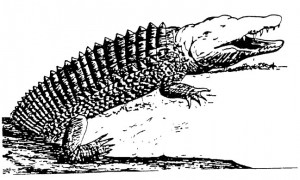Attacks by crocodiles on human beings have been reported in Korogwe since 1925 but accurate statistics are not available for the period before 1990. The table below compares human fatalities with the corresponding number of crocodiles shot by professional hunters or game scouts between January 1990 and April 1994:
Date – Human Deaths – Crocodile Deaths
1990 . . . . . . 5 . . . . . 10
1991 . . . . . . 9 . . . . . 5
1992 . . . . . . 8 . . . . . 8
1993 . . . . . .11 . . . . . 10
1994 . . . . . .19 . . . . . 16
It seems strange that these voracious human predators are not exterminated, indeed they seem to be flourishing at the expense of the local population.
According to local beliefs not all people are susceptible to crocodile attack. From long ago certain crocodiles have been fed meat and deliberately tamed for service. This ‘service’ has included transporting their ‘owners’ across the river in times of floods. However, more sinister activities are also attributed to the tamed beasts. At one point the Pangani River is punctuated by five small islands. Crocodile Owners are reputed to frequent these islands employing their animals as procurers of women. Hapless ladies brought by the crocodiles would undoubtedly be in no state to resist demands placed upon them. In addition, tamed crocodiles are believed to be used as assassins, disposing of enemies of their ‘owners. Crocodiles in this employ will apparently travel considerable distances from water in pursuit of their victims, even into their houses. These talented animals may be given as an inheritance to relatives or, particularly after any misbehaviour, they may be slaughtered for their skins.
WHY HAVE CROCODILE ATTACKS INCREASED RECENTLY?
Up to the 1950’s the river was clean; fish were plentiful and bathing and collecting water were relatively safe activities. Since then, overfishing, coupled with the dumping of the sisal industry’s waste products into the river, has reduced the crocodiles’ primary food supply. In addition, traditional riverine customs are no longer properly observed. Not only are cooking pots, maize cobs and offal thrown into the river, but menstruating women now visit the river, further provoking the crocodiles. Thus increasing attacks are seen as a consequence of human folly.
If a person is missing and a crocodile attack is suspected, advice is sought from certain authorities, who will then consult the beast in order to determine whether they have been involved. If a body turns up in the river these men, protected by witchcraft and by local medicines applied to their bodies, will fish it out with impunity. Such medicine is available for sale and may be applied, for example, by boys collecting sand from the river’ in order to ward off attack.
WHY ARE CROCODILES NOT HUNTED TO URBAN EXTINCTION?
Firstly, they are viewed as a natural resource and their destruction is controlled. Secondly, over and above the difficulty that government game scouts have in obtaining ammunition and a daily wage are other ingrained beliefs which inhibit both individual and group action. Foremost of these is the real fear of witchcraft used by the ‘tamed’ crocodiles’ owners. Others believe that it is impossible to kill a ‘tamed’ crocodile. Another worry is that a crocodile’s killer will subsequently lose a son to another beast. Finally, if one is successful in hunting, it is essential to bury the crocodile’s bile in front of witnesses to avoid the possibility that others might use it as a poison.
WHAT ADVICE CAN BE GIVEN TO A PERSON ATTACKED?
The best defensive action is to counter-attack the animal’s eyes; indeed, most survivors presenting to the two Korogwe hospitals attribute their escape to this manoeuvre.
HOW CAN CROCODILE BITES BE REDUCED IN KOROGWE?
The importance of a reliable, pumped water supply in reducing risky bathing and water collection is clearly shown in the statistics for 1994. Eighteen deaths – about one a week – coincided with the failure of the town water pump. Failing this, villagers could collect water from the various bridges by using a long rope. Concerted village activity to reduce the vegetation along the river’s edge would help hunters to flush out the enemy. Lastly, the role of education in counteracting the influence of superstition cannot be over emphasised. This would reduce the pervading fear and allow crocodiles to be killed more freely.
Richard Scott and Heather Scott
(This is an abbreviated version of an article which appeared in the British Medical Journal of 24-31 December 1994 – Ed).

